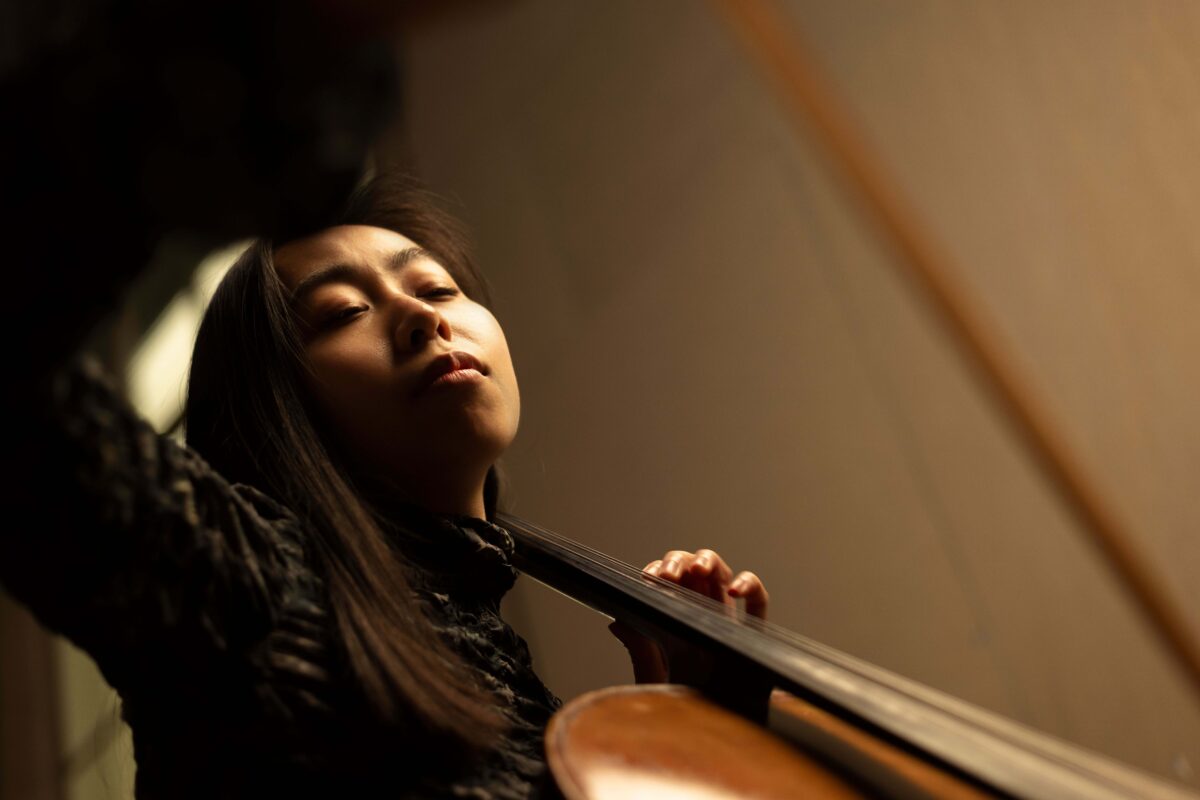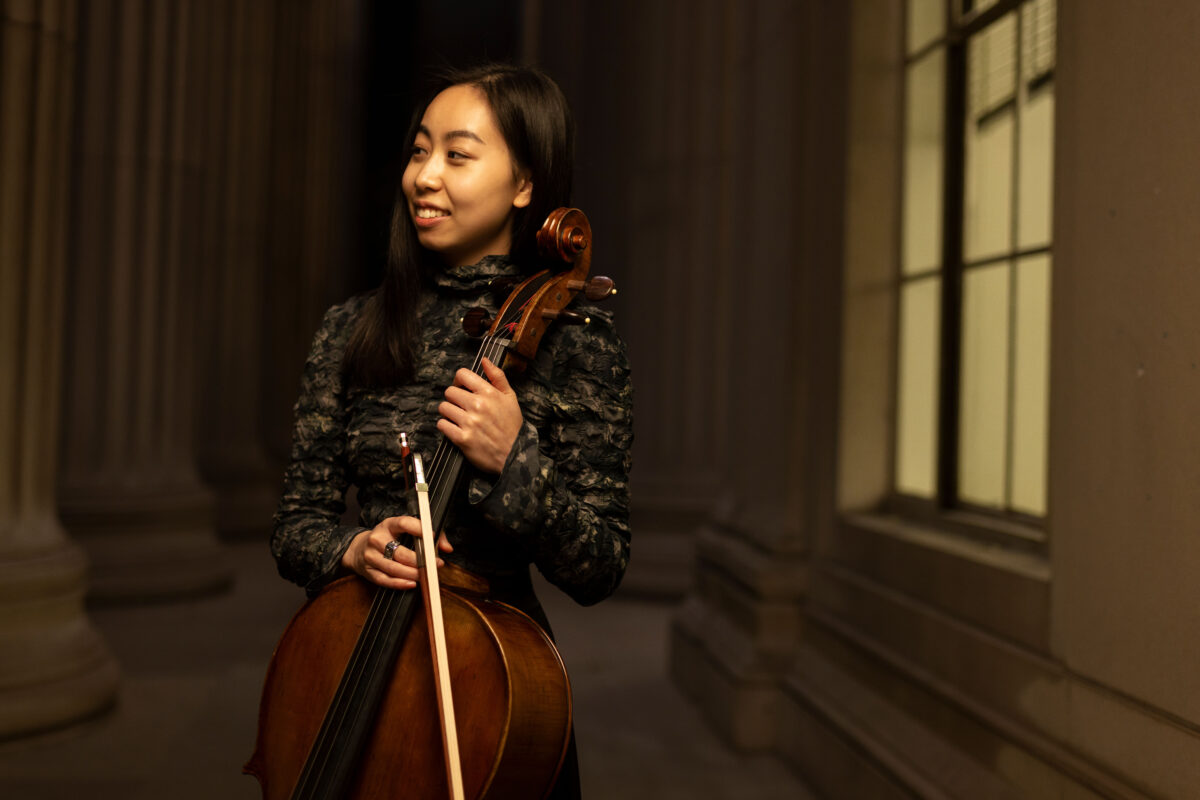Valerie Chen EECS ’22 is a gifted cellist at home in almost any musical genre. Her diverse and challenging repertoire ranges from Brahms and Debussy to the themes from “Game of Thrones” and Pokémon. She is also a gifted musical arranger and an ambassador for the cello. “The point of music is to elicit a response,” says Chen, the winner of this year’s Louis Sudler Prize at MIT. “To share, in expression and community. The way you get to that sharing doesn’t really matter.”
The Sudler Prize is awarded annually to a graduating senior who demonstrates excellence in music, theater, painting, sculpture, design, architecture, or film. An endowment fund provides a $2,500 award to the honoree. Chen, who minored in music, was recognized for her musical talents and even more for contributions on and beyond campus.
“A cellist of the absolute highest caliber,” wrote Patricia Tang, Associate Professor in Theater, in Chen’s Sudler Prize nomination letter, “Valerie has used her cello skills not only to build community but also to give back to the MIT community and to the wider world.”
“Her playing is on par with the finest conservatory students and even young professionals,” added Kenan Sahin Distinguished Professor of Music and clarinetist Evan Ziporyn. “I soon realized that her playing was more than matched by her commitment to community. She made the cello section into a family, both in rehearsal and out.”
A Receptive and Appreciative Community
Chen began playing cello at eight. She was captivated by the sounds it made. “I remember a morning, the day after my parents rented me my first cello, when we were supposed to get up before dawn for a family trip,” says the California native, who spent four years as the youngest and only high school member of the La Jolla Symphony. “I woke up two hours before that so I could try to play my first scales. It didn’t go all that well. But I loved it.”
At MIT, Chen was omnipresent in the music scene. She anchored the cello section with the MIT Symphony Orchestra (MITSO) and played with the MIT Chamber Music Society. She contributed remote video recordings after she returned to San Diego during the COVID pandemic. And she founded CelloWorld();, MIT’s first all-cello student-led organization. The group’s name is a pun any novice programmer will understand. In a corollary pun–Chen confesses she can’t help making them when the opportunity arises–she named CelloWorld();’s performance ensemble Cello++ (CelloWorld(); also has a less formal group that meets once a week for sight-reading.)
“One of the things I most appreciate about MIT is the unparalleled enthusiasm you can find for anything you’re passionate about,” says Chen, “Another is that people here also get my jokes.”
An Emerson scholar—the Emerson/Harris program funds private musical instruction for up to 50 MIT students each year—Chen chose MIT because of the musical opportunities available. “I knew I wanted to study at a technical school,” says Chen. “But I also knew I needed music in my life. That’s why I applied here in the first place. And I’m truly grateful for the Emerson program, which helped me keep music in my life.”

A World Built Around the Cello
After founding CelloWorld();, Chen quickly began recruiting members. “I saw a person I didn’t know, standing at a bus stop with a cello,” she recalls. “It took me a little while, but I finally spoke up and said Hi, I also play cello. Would you like to join our group? Learning to talk to strangers has helped me in so many ways, in writing emails, in going after things I’m drawn to but am not sure about. It’s helped me get over the fear of rejection. Now I hear stories of other people in the club approaching cellists. And I’m really proud of that.”
For Chen, music is also a means to lift people’s spirits and to address pressing social concerns. Back on campus for the past academic year, she helped ease tensions around the ongoing pandemic through the MindHandHeart Initiative–playing weekly lunchtime concerts in Lobby 7. Chen and CelloWorld(); joined forces with the MIT Ribotones–a group that performs music for vulnerable populations in Greater Boston–with the Music Unites: Songs for Equity (MUSE) project. “Our club discussed taking a position on the Black Lives Matter movement,” she says. “There was a lot of traction. I asked what we could do, on a voluntary basis, as musicians, within our specific expertise.” The outcome was the MUSE project, an effort to identify and perform works by African American composers, who are often underrepresented in the classical sphere. The MUSE project recorded multiple videos and culminated in a final in-person concert this fall in Huntington Hall (10-250).
Looking Back, and Looking Forward
On April 15, as part of the Emerson/Harris Solo Recital Series, Chen and pianist Eileen Huang–a member of the MIT music faculty– played a concert at Killian Hall. The program included works by Gabriel Fauré, Dmitry Kabalevsky, and Bright Sheng. After four years at MIT, Chen is looking forward, handing the reins of CelloWorld(); to the students she recruited, trained, and entertained.
“I sometimes feel bad that my fellow musicians have to put up with my sense of humor,” says Chen, who will stay on campus next year to start a PhD program studying Robotics at EECS in the Fall. “My current joke when I show up at meetings is that I’m raising the average age of the group one student at a time. I do hope to continue playing music after graduation, here and elsewhere. But I don’t want CelloWorld(); to be about me. My dream is to come back to MIT in 20 years and find that the club is still up and running and that no one remembers who started it.”
—
Written by Ken Shulman
Editorial Direction by Leah Talatinian, Arts at MIT
The Council for the Arts at MIT presents several awards annually to MIT students who have demonstrated excellence in the arts

